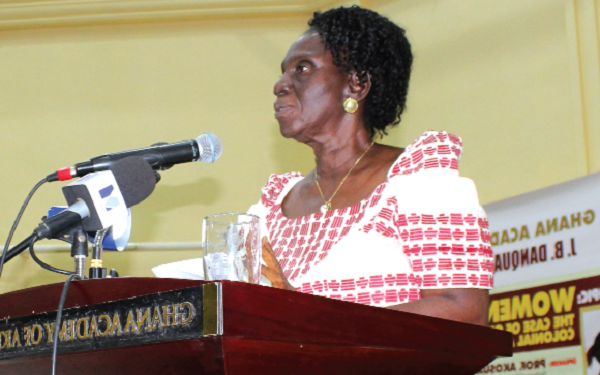
Post-colonial era was favourable for advancement of Ghanaian women
A professor of History at the History Department of the University of Ghana, Prof. Akosua Adoma Perbi, has described the post-colonial era of Ghana as a revolutionary period in the country’s history that provided a favourable atmosphere for more women to participate in political and civil engagement.
She noted that the election of Mabel Dove as the first female member of the Legislative Assembly in 1954 and the recruitment of the first female, Mrs Irene Wuntomi, in 1978 into the administrative staff of government signified the favourable atmosphere of post-colonial Ghana for women development.
That, she indicated, was in contrast to the colonial era where women were not treated fairly as they were either made to resign from work upon marriage or lost their jobs upon taking maternity leave.
Event
Prof. Perbi was speaking at the 51st edition of the J.B. Danquah Memorial Lecture which was instituted in 1968. The theme for the event which was held in Accra was: “Women in History, The Case of Ghana - Pre-Colonial, Colonial and Post-Colonial.”
According to Prof. Perbi, who happened to be the third woman to deliver the J.B. Danquah lecture series, women played significant roles in Ghana’s history by financing and endorsing political candidates.
Advertisement
She added that: “An examination of parliamentary debates from 1960-1965 showed that women members of Parliament stood for Ghanaian women in agriculture, health, education and employment.”
She also noted that the women occupation of high-profile positions in the governance structure of the country, such as having two female Chief Justices in succession and three female Attorney-Generals in succession, only emphasised how far women had come.
Economy
“The changing nature of Ghana’s economy from labour intensive to an intellectually challenging economy is providing more opportunities for Ghanaian women to make their mark,” she said.
A medical doctor, Dr Yaw Perbi, remarked that the social growth of women in the country today was largely due to the sensitisation that was carried out on the need for girl-child education some years ago.
He, however, cautioned against over-emphasising girl-child education to the neglect of the boy child, as the education of the boy was equally paramount.
